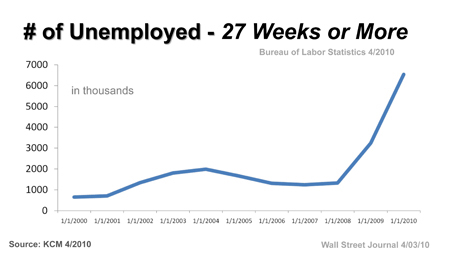Let’s take a look at how unemployment affects supply and demand of real estate.
A person without a job is unable to purchase a house. Therefore, as unemployment rates rise, potential purchasers are removed from the market, decreasing demand. And, in the last two years, unemployment has risen significantly.
Supply is also significantly affected by unemployment. According to a Wall Street Journal opinion article, “the number of long-term jobless – those out of work for 27 weeks or more – jumped again to 6.55 million and as a share of the total jobless hit a new record of 44.1 percent up from 40.9 percent in February and 24.6 percent a year earlier. This means that nearly one of every two Americans who have lost his job is waiting at least a half year to get a new one.”
How many of us could afford to pay a mortgage if we were out of work for over six months? And, that’s what is happening. Families can’t afford to pay their mortgages. This problem is compounded when they owe more than their homes are worth.
A Freddie Mac report shows that job losses drove the vast majority of missed payments in 2009 among prime borrowers, or those with good credit. Freddie Mac said that 58 percent of borrowers who were delinquent in 2009 cited unemployment or reduced income for reasons of missing their payments. So, while unemployment remains, the number of homes going into foreclosure will continue to increase.
What does this mean? Unemployment is diminishing demand and will be increasing future supply of distressed properties coming on the market, thus decreasing pricing. If you’re thinking about selling, now is the time. If you’re thinking of buying, waiting could be an option if you watch interest rates.
Click here for more information about today’s real estate market.
Categories: Real Estate News

